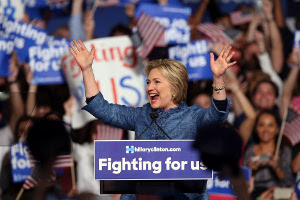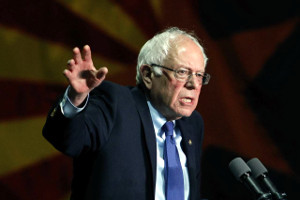Adam Green is co-founder of the Progressive Change Campaign Committee. He
is on Twitter: @AdamGreen.
Third Way President Jon Cowan wrote in Think Tank recently that Hillary Clinton‘s Super Tuesday wins show that “liberal populism is being routed in the Democratic primaries.”
Actually, Hillary Clinton won the Democratic primary in Ohio and four other states this past Tuesday by riding the economic populist tide, not fighting it. She engaged Bernie Sanders in a battle to own the mantle of economic populist and, by doing so, fundamentally shifted the center of gravity in the Democratic Party.
A year ago, it was almost unimaginable that Mrs. Clinton would be campaigning
on economic populist ideas such as jailing Wall Street bankers who break the
law, breaking up “too big to fail” banks, debt-free education at public colleges
and universities, and vowing to expand Social Security.
Mrs. Clinton has gone out of her way to say she is bolder on Wall Street reform than Bernie Sanders. “If there’s one issue in the Democratic presidential primary on which Bernie Sanders’s advantage over Hillary Clinton should be clear-cut, it is Wall Street reform,” Russell Berman wrote in The Atlantic in January. “Yet as the two candidates unveil their policy plans for regulatory reform, it is Clinton who is trying to outflank Sanders by arguing that her proposal is far tougher on the banks whose risky bets actually caused the financial crisis in 2008.”
Mr. Sanders and others have argued that his Wall Street plan is bolder.
Either way, it’s notable that Mrs. Clinton is not holding herself out to voters
as the anti-populist: She has momentum because she held herself out as an
economic populist.
Voters have made clear they want that message. Public Policy Polling, a Democratic firm, found in the final hours before the Iowa caucuses that 62% of Hillary Clinton supporters said “a candidate’s willingness to challenge corporate power and take strong economic populist positions” was “very important” to their choice for president. Seventy-one percent of Clinton supporters said the same about “a candidate’s commitment to addressing income inequality.” Eighty-four percent of likely caucus-goers and, within that, 87% of Clinton supporters, said “a candidate’s commitment to never cutting Social Security” is very important.
National polling by GBA strategies, a Democratic firm, for the Progressive Change Institute in January 2015 of Republican, independent, and Democratic likely voters found that 70% favor expanding Social Security, 71% support debt-free college, and 71% want the ability to buy health insurance through Medicare instead of private insurance. Among the proposals voters support to pay for these ideas: taxing risky Wall Street speculation, closing corporate tax loopholes, and making the wealthy pay the same rate into Social Security as everyone else.
A populist economic tide is rising across the U.S. Mrs. Clinton’s campaign is working to ride that tide–and by shifting the center of gravity in the Democratic Party, she is helping to position Democrats for success in November.
Third Way President Jon Cowan wrote in Think Tank recently that Hillary Clinton‘s Super Tuesday wins show that “liberal populism is being routed in the Democratic primaries.”
Actually, Hillary Clinton won the Democratic primary in Ohio and four other states this past Tuesday by riding the economic populist tide, not fighting it. She engaged Bernie Sanders in a battle to own the mantle of economic populist and, by doing so, fundamentally shifted the center of gravity in the Democratic Party.

Democratic presidential candidate Hillary Clinton at the Palm Beach County Convention Center on March 15 in West Palm Beach, Fla. PHOTO: JOE RAEDLE/GETTY IMAGES
|
Mrs. Clinton has gone out of her way to say she is bolder on Wall Street reform than Bernie Sanders. “If there’s one issue in the Democratic presidential primary on which Bernie Sanders’s advantage over Hillary Clinton should be clear-cut, it is Wall Street reform,” Russell Berman wrote in The Atlantic in January. “Yet as the two candidates unveil their policy plans for regulatory reform, it is Clinton who is trying to outflank Sanders by arguing that her proposal is far tougher on the banks whose risky bets actually caused the financial crisis in 2008.”
|
Voters have made clear they want that message. Public Policy Polling, a Democratic firm, found in the final hours before the Iowa caucuses that 62% of Hillary Clinton supporters said “a candidate’s willingness to challenge corporate power and take strong economic populist positions” was “very important” to their choice for president. Seventy-one percent of Clinton supporters said the same about “a candidate’s commitment to addressing income inequality.” Eighty-four percent of likely caucus-goers and, within that, 87% of Clinton supporters, said “a candidate’s commitment to never cutting Social Security” is very important.
National polling by GBA strategies, a Democratic firm, for the Progressive Change Institute in January 2015 of Republican, independent, and Democratic likely voters found that 70% favor expanding Social Security, 71% support debt-free college, and 71% want the ability to buy health insurance through Medicare instead of private insurance. Among the proposals voters support to pay for these ideas: taxing risky Wall Street speculation, closing corporate tax loopholes, and making the wealthy pay the same rate into Social Security as everyone else.
A populist economic tide is rising across the U.S. Mrs. Clinton’s campaign is working to ride that tide–and by shifting the center of gravity in the Democratic Party, she is helping to position Democrats for success in November.











